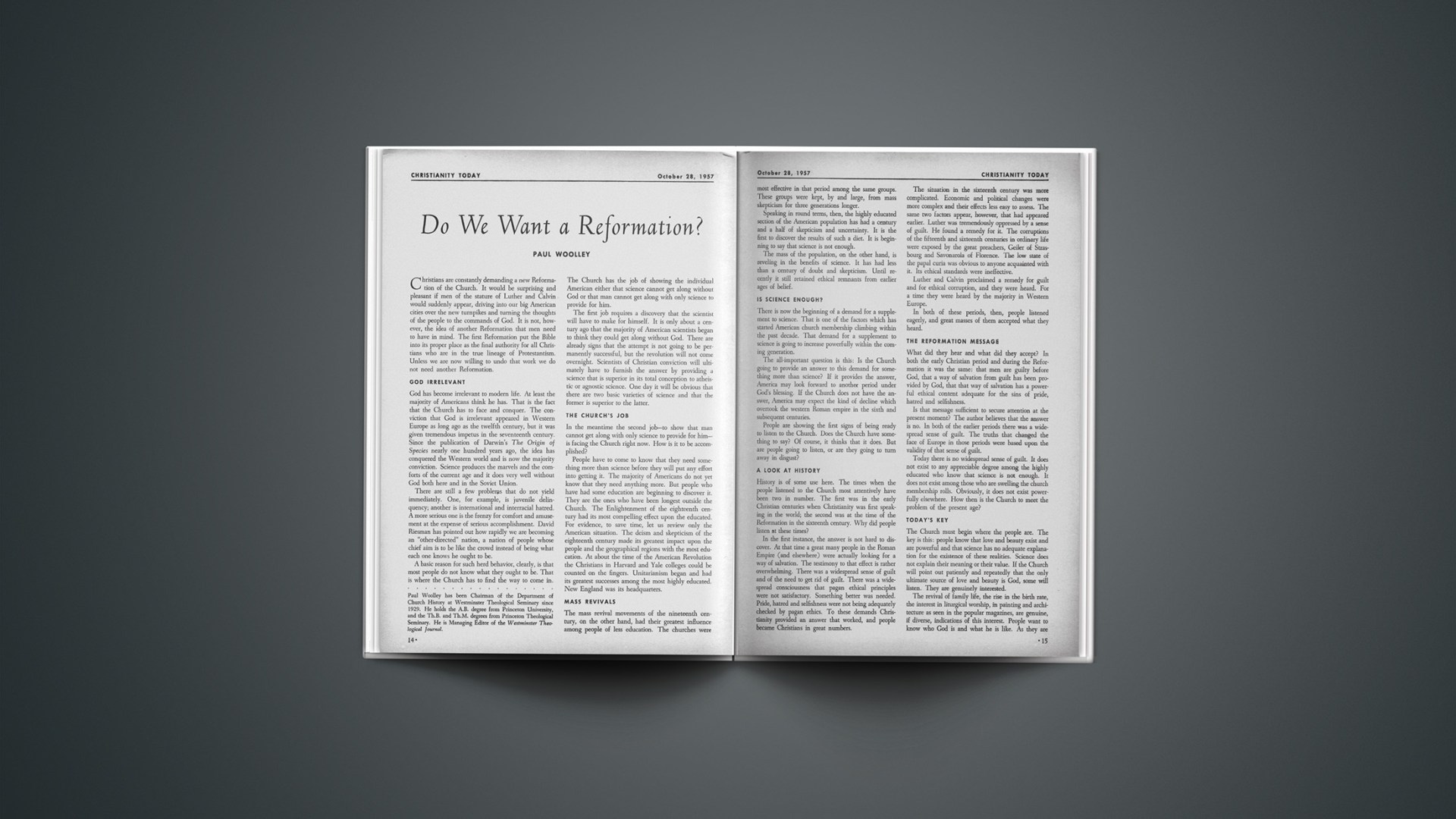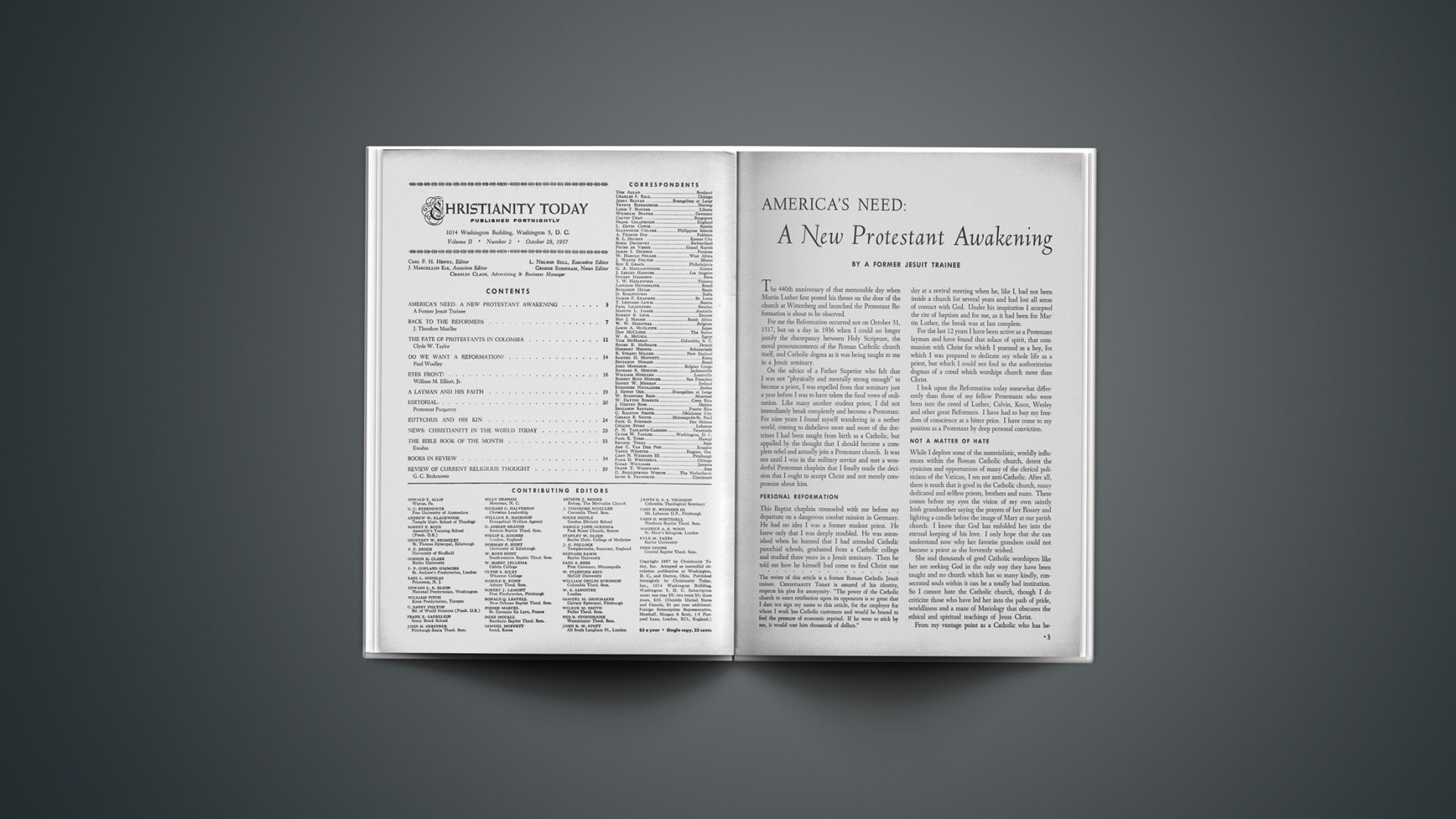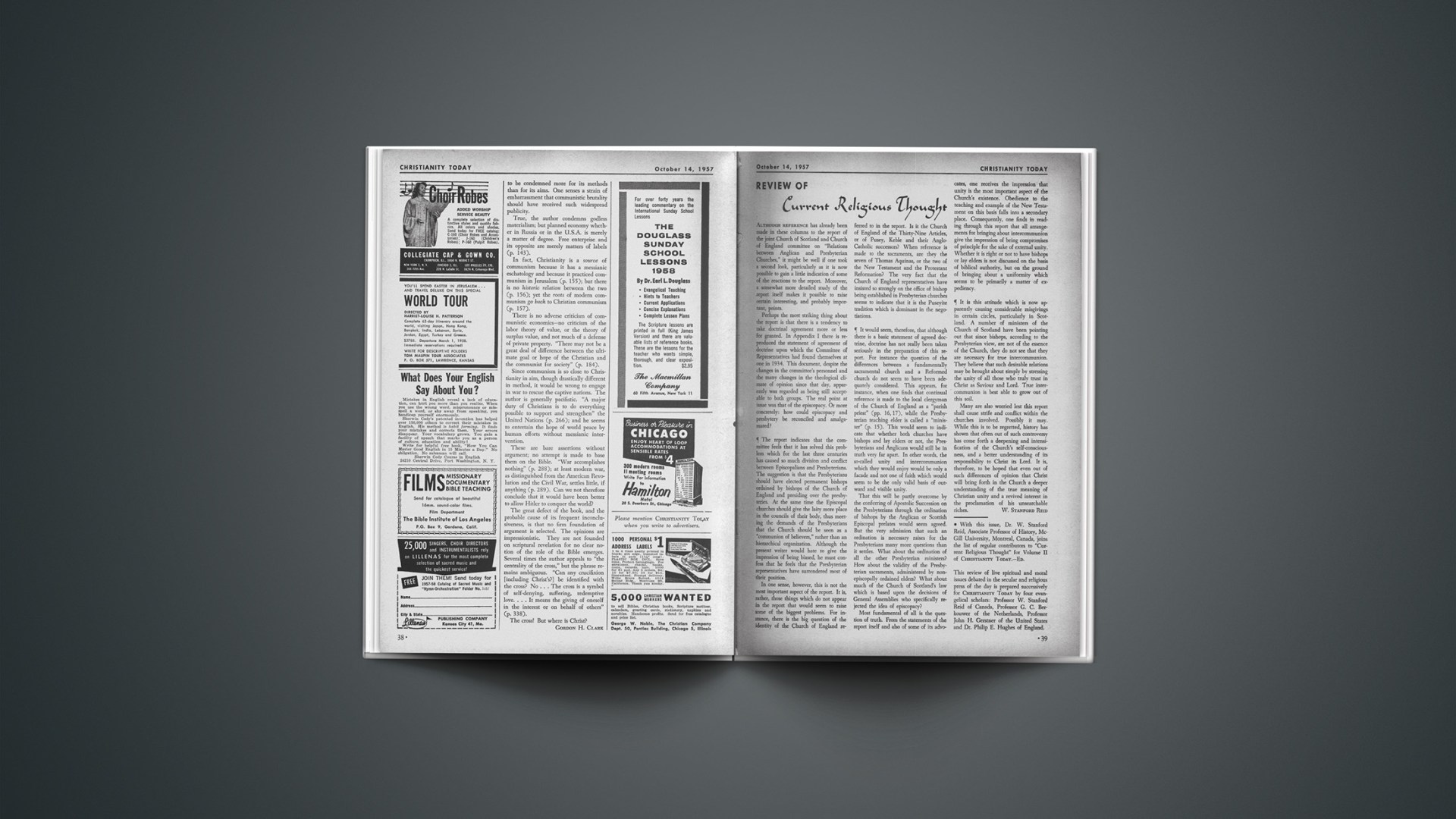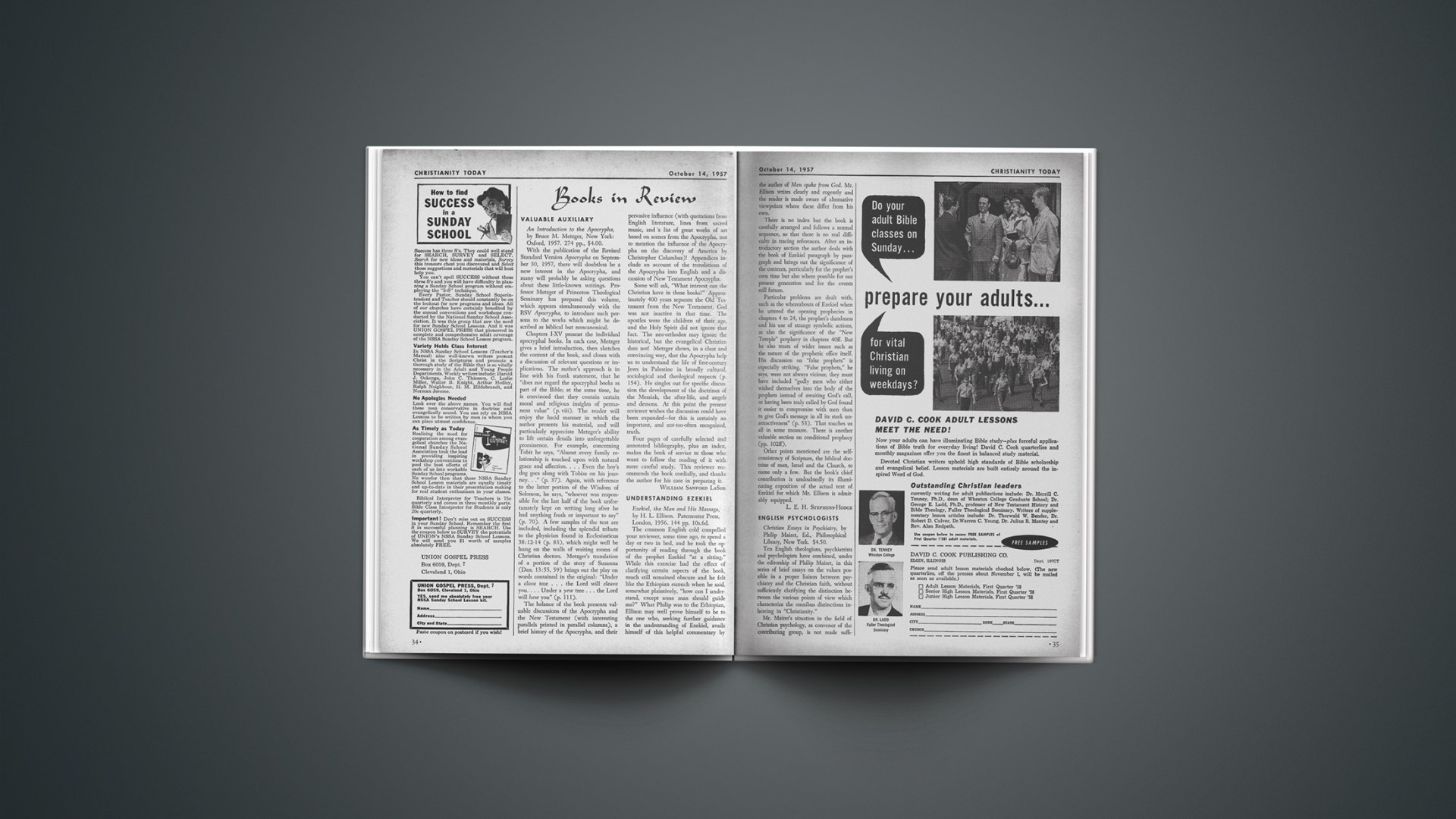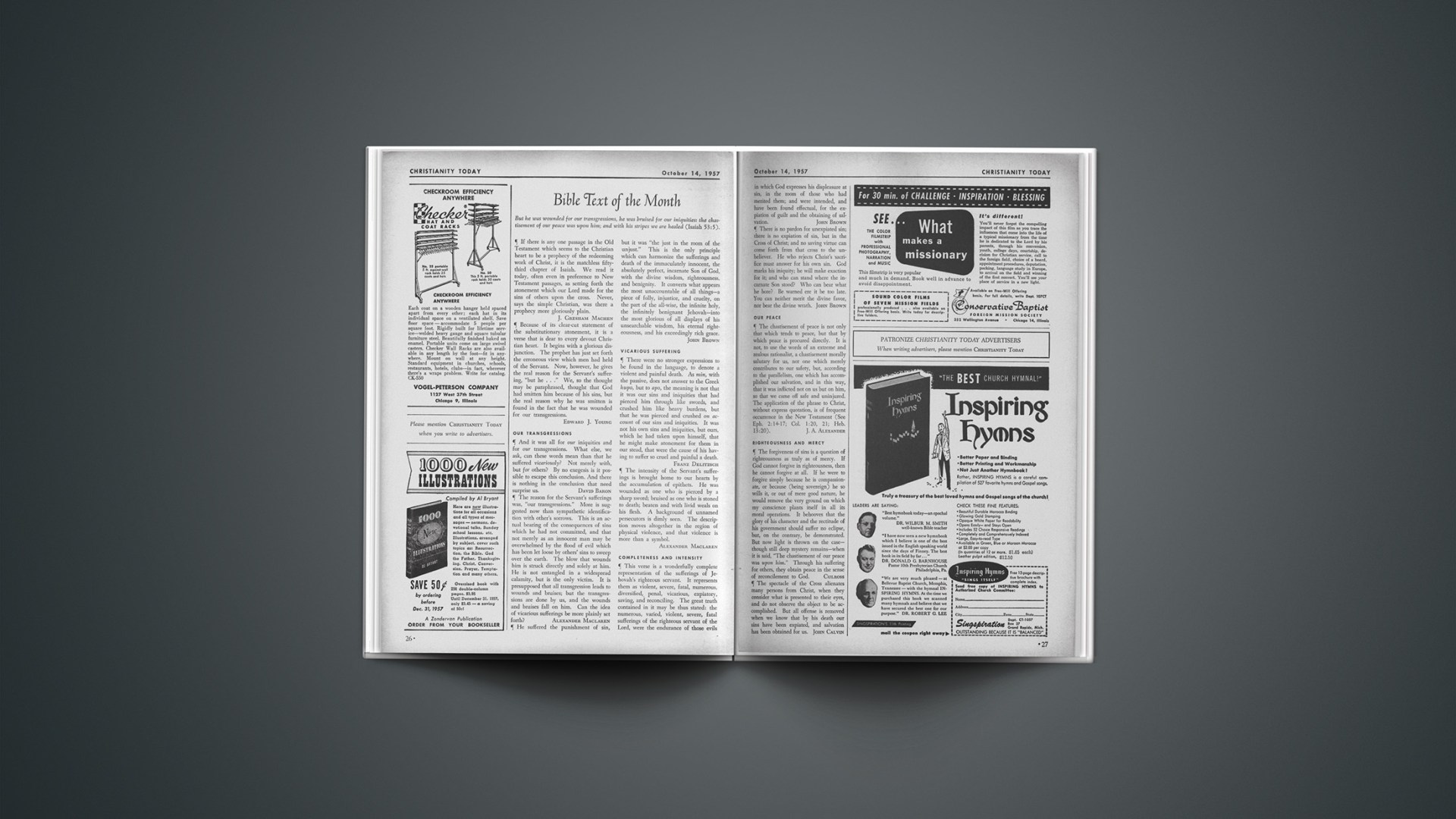Christians are constantly demanding a new Reformation of the Church. It would be surprising and pleasant if men of the stature of Luther and Calvin would suddenly appear, driving into our big American cities over the new turnpikes and turning the thoughts of the people to the commands of God. It is not, however, the idea of another Reformation that men need to have in mind. The first Reformation put the Bible into its proper place as the final authority for all Christians who are in the true lineage of Protestantism. Unless we are now willing to undo that work we do not need another Reformation.
God Irrelevant
God has become irrelevant to modern life. At least the majority of Americans think he has. That is the fact that the Church has to face and conquer. The conviction that God is irrelevant appeared in Western Europe as long ago as the twelfth century, but it was given tremendous impetus in the seventeenth century. Since the publication of Darwin’s The Origin of Species nearly one hundred years ago, the idea has conquered the Western world and is now the majority conviction. Science produces the marvels and the comforts of the current age and it does very well without God both here and in the Soviet Union.
There are still a few problems that do not yield immediately. One, for example, is juvenile delinquency; another is international and interracial hatred. A more serious one is the frenzy for comfort and amusement at the expense of serious accomplishment. David Riesman has pointed out how rapidly we are becoming an “other-directed” nation, a nation of people whose chief aim is to be like the crowd instead of being what each one knows he ought to be.
A basic reason for such herd behavior, clearly, is that most people do not know what they ought to be. That is where the Church has to find the way to come in. The Church has the job of showing the individual American either that science cannot get along without God or that man cannot get along with only science to provide for him.
The first job requires a discovery that the scientist will have to make for himself. It is only about a century ago that the majority of American scientists began to think they could get along without God. There are already signs that the attempt is not going to be permanently successful, but the revolution will not come overnight. Scientists of Christian conviction will ultimately have to furnish the answer by providing a science that is superior in its total conception to atheistic or agnostic science. One day it will be obvious that there are two basic varieties of science and that the former is superior to the latter.
The Church’S Job
In the meantime the second job—to show that man cannot get along with only science to provide for him—is facing the Church right now. How is it to be accomplished?
People have to come to know that they need something more than science before they will put any effort into getting it. The majority of Americans do not yet know that they need anything more. But people who have had some education are beginning to discover it. They are the ones who have been longest outside the Church. The Enlightenment of the eighteenth century had its most compelling effect upon the educated. For evidence, to save time, let us review only the American situation. The deism and skepticism of the eighteenth century made its greatest impact upon the people and the geographical regions with the most education. At about the time of the American Revolution the Christians in Harvard and Yale colleges could be counted on the fingers. Unitarianism began and had its greatest successes among the most highly educated. New England was its headquarters.
Mass Revivals
The mass revival movements of the nineteenth century, on the other hand, had their greatest influence among people of less education. The churches were most effective in that period among the same groups. These groups were kept, by and large, from mass skepticism for three generations longer.
Speaking in round terms, then, the highly educated section of the American population has had a century and a half of skepticism and uncertainty. It is the first to discover the results of such a diet. It is beginning to say that science is not enough.
The mass of the population, on the other hand, is reveling in the benefits of science. It has had less than a century of doubt and skepticism. Until recently it still retained ethical remnants from earlier ages of belief.
Is Science Enough?
There is now the beginning of a demand for a supplement to science. That is one of the factors which has started American church membership climbing within the past decade. That demand for a supplement to science is going to increase powerfully within the coming generation.
The all-important question is this: Is the Church going to provide an answer to this demand for something more than science? If it provides the answer, America may look forward to another period under God’s blessing. If the Church does not have the answer, America may expect the kind of decline which overtook the western Roman empire in the sixth and subsequent centuries.
People are showing the first signs of being ready to listen to the Church. Does the Church have something to say? Of course, it thinks that it does. But are people going to listen, or are they going to turn away in disgust?
A Look At History
History is of some use here. The times when the people listened to the Church most attentively have been two in number. The first was in the early Christian centuries when Christianity was first speaking in the world; the second was at the time of the Reformation in the sixteenth century. Why did people listen at these times?
In the first instance, the answer is not hard to discover. At that time a great many people in the Roman Empire (and elsewhere) were actually looking for a way of salvation. The testimony to that effect is rather overwhelming. There was a widespread sense of guilt and of the need to get rid of guilt. There was a widespread consciousness that pagan ethical principles were not satisfactory. Something better was needed. Pride, hatred and selfishness were not being adequately checked by pagan ethics. To these demands Christianity provided an answer that worked, and people became Christians in great numbers.
The situation in the sixteenth century was more complicated. Economic and political changes were more complex and their effects less easy to assess. The same two factors appear, however, that had appeared earlier. Luther was tremendously oppressed by a sense of guilt. He found a remedy for it. The corruptions of the fifteenth and sixteenth centuries in ordinary life were exposed by the great preachers, Geiler of Strasbourg and Savonarola of Florence. The low state of the papal curia was obvious to anyone acquainted with it. Its ethical standards were ineffective.
Luther and Calvin proclaimed a remedy for guilt and for ethical corruption, and they were heard. For a time they were heard by the majority in Western Europe.
In both of these periods, then, people listened eagerly, and great masses of them accepted what they heard.
The Reformation Message
What did they hear and what did they accept? In both the early Christian period and during the Reformation it was the same: that men are guilty before God, that a way of salvation from guilt has been provided by God, that that way of salvation has a powerful ethical content adequate for the sins of pride, hatred and selfishness.
Is that message sufficient to secure attention at the present moment? The author believes that the answer is no. In both of the earlier periods there was a widespread sense of guilt. The truths that changed the face of Europe in those periods were based upon the validity of that sense of guilt.
Today there is no widespread sense of guilt. It does not exist to any appreciable degree among the highly educated who know that science is not enough. It does not exist among those who are swelling the church membership rolls. Obviously, it does not exist powerfully elsewhere. How then is the Church to meet the problem of the present age?
Today’S Key
The Church must begin where the people are. The key is this: people know that love and beauty exist and are powerful and that science has no adequate explanation for the existence of these realities. Science does not explain their meaning or their value. If the Church will point out patiently and repeatedly that the only ultimate source of love and beauty is God, some will listen. They are genuinely interested.
The revival of family life, the rise in the birth rate, the interest in liturgical worship, in painting and architecture as seen in the popular magazines, are genuine, if diverse, indications of this interest. People want to know who God is and what he is like. As they are pointed to the Scriptures as the reliable source of information about him, they will find that here is the source of unending love, of superlative beauty. But they will also find that God is holy and God is righteous. Gradually they will discover that love and beauty cannot develop except under the favor of God, and that that favor requires holiness. Holiness is attainable only when sin is dealt with.
Thus the time will arrive again, if God continues his patience toward this age, when sin must be faced as it was in previous ages of crisis. The sense of guilt will return. The message of salvation from guilt will once more be overwhelmingly needed.
The evangelical Church of today is missing its optunity because it does not have an adequate sense of timing. It must, if it is to be heard, preach God as the source of love and beauty and, for the moment, emphasize that message. The whole system of truth must be available, of course, but the proportion, the timing, is vital. The people who have been longest away from the Church will be the first to return. The time to reach them has arrived.
Paul Woolley has been Chairman of the Department of Church History at Westminster Theological Seminary since 1929. He holds the A.B. degree from Princeton University, and the Th.B. and Th.M. degrees from Princeton Theological Seminary. He is Managing Editor of the Westminster Theological Journal.

